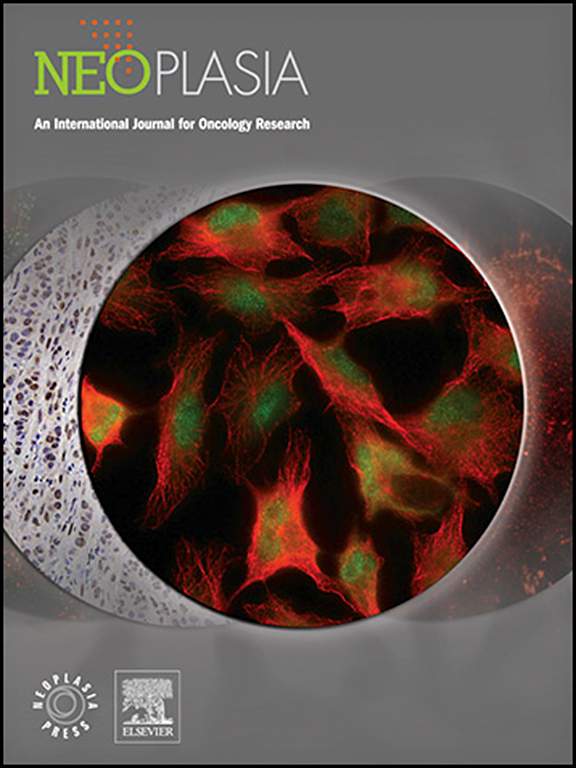DNA错配修复蛋白MSH6是一种新的PD-L1表达调节因子
IF 7.7
2区 医学
Q1 Biochemistry, Genetics and Molecular Biology
引用次数: 0
摘要
免疫检查点抑制剂(ICIs)在错配修复缺陷(MMRd)癌症亚组中非常有效,但仍有50%对治疗产生耐药性。我们首次表明,这可能是由于不同MMR基因丢失后与ICIs反应相关的因素的差异调节。本研究表明,缺失MMR基因MLH1、MSH2和PMS2后,PD-L1表达增加。然而,在MSH6缺失的情况下,情况并非如此,我们发现这是由于MSH6作为PD-L1转录的直接调节剂的新作用,依赖于组蛋白三甲基转移酶SETD2的募集。MLH1和MSH6敲除(KO)细胞的新一代测序显示,尽管MSH6 KO细胞具有更高的突变负担,但与MLH1 KO细胞相比,MSH6 KO细胞的微卫星不稳定性显著降低。这些发现强调了在MMRd队列中进行基因特异性分层的必要性。本文章由计算机程序翻译,如有差异,请以英文原文为准。
The DNA mismatch repair protein, MSH6 is a novel regulator of PD-L1 expression
Immune checkpoint inhibitors (ICIs) are extremely effective in a subgroup of mismatch repair-deficient (MMRd) cancers, but ∼50% remain resistant to treatment. We have shown for the first time that this may be due to the differential regulation of factors linked to response to ICIs upon loss of the different MMR genes. Here, we show that increased PD-L1 expression is observed upon loss of the MMR genes MLH1, MSH2 and PMS2. However, this is not true upon loss of MSH6, and we show that this is due to a novel role for MSH6 as a direct regulator of PD-L1 transcription, dependent on recruitment by the histone trimethyltransferase SETD2. Next-generation sequencing of MLH1 and MSH6 knockout (KO) cells revealed that MSH6 KO cells have significantly lower microsatellite instability in comparison to MLH1 KO cells, despite MSH6 KO cells having a higher mutational burden. These findings emphasise the need for gene-specific stratification in the MMRd cohort.
求助全文
通过发布文献求助,成功后即可免费获取论文全文。
去求助
来源期刊

Neoplasia
医学-肿瘤学
CiteScore
9.20
自引率
2.10%
发文量
82
审稿时长
26 days
期刊介绍:
Neoplasia publishes the results of novel investigations in all areas of oncology research. The title Neoplasia was chosen to convey the journal’s breadth, which encompasses the traditional disciplines of cancer research as well as emerging fields and interdisciplinary investigations. Neoplasia is interested in studies describing new molecular and genetic findings relating to the neoplastic phenotype and in laboratory and clinical studies demonstrating creative applications of advances in the basic sciences to risk assessment, prognostic indications, detection, diagnosis, and treatment. In addition to regular Research Reports, Neoplasia also publishes Reviews and Meeting Reports. Neoplasia is committed to ensuring a thorough, fair, and rapid review and publication schedule to further its mission of serving both the scientific and clinical communities by disseminating important data and ideas in cancer research.
 求助内容:
求助内容: 应助结果提醒方式:
应助结果提醒方式:


